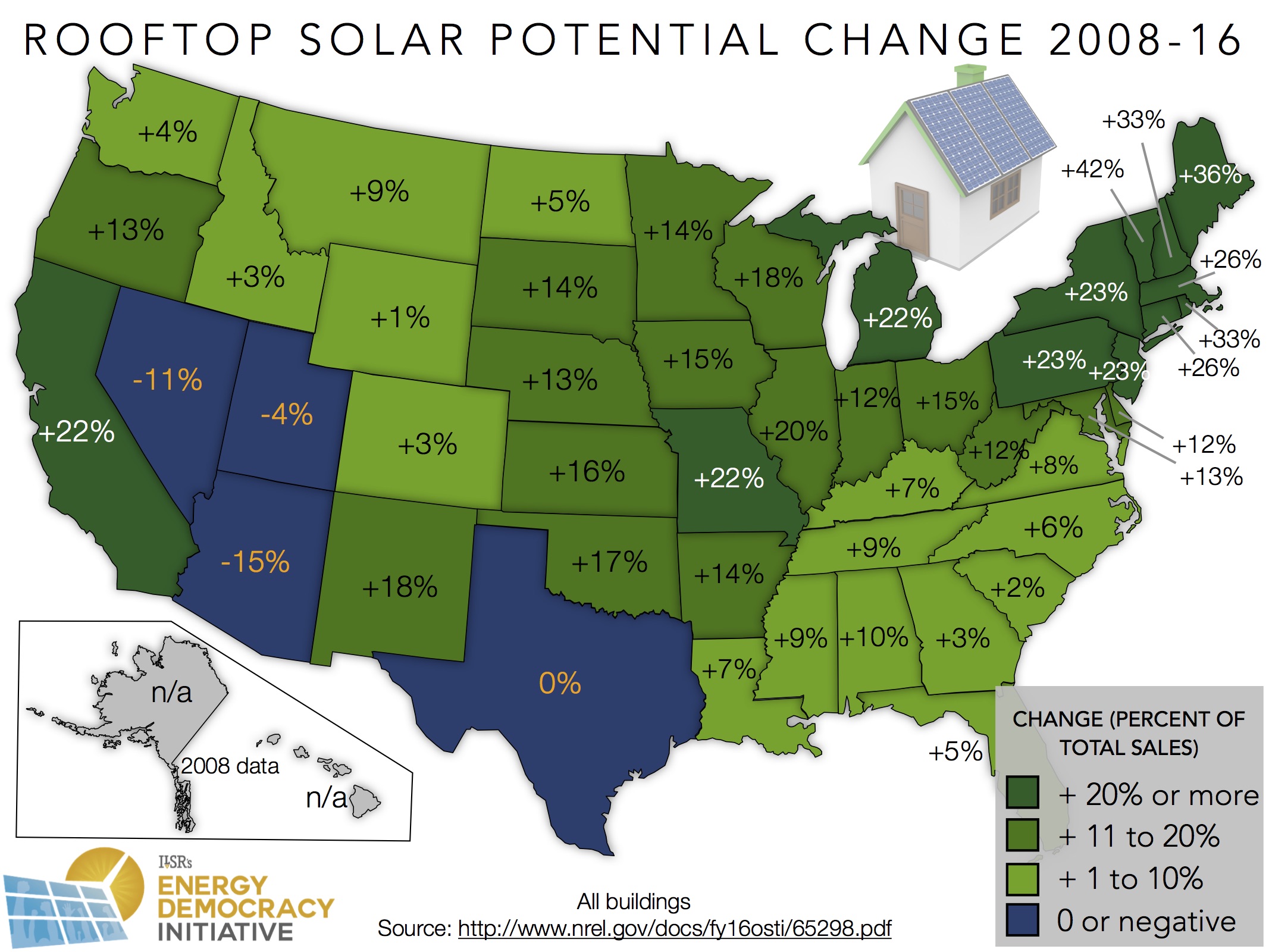This week in Energy Democracy:
We get the details on the policies blocking Microgrids implementation, learn about how Massachusetts raises their net metering cap but lowers reimbursement rate, and how we have the power for 100% renewable energy.
Featured
Sharply higher rooftop solar potential increases potential for energy self-reliance by John Farrell, CleanTechnica
Critics say Puerto Rico bill overlooks industry trend by Arianna Skibell, E&E News
100 percent renewable energy? We have the power. by Rob Sargent, Huffington Post
America has vast renewable energy resources – enough to meet our needs many times over. The United States has the technical potential to meet its current electricity needs more than 100 times over with solar energy and more than 10 times over with wind energy. What’s more, we have massive potential to save energy – by some estimates, reducing our overall energy use by 40 to 60 percent below current levels by mid-century, even as our economy continues to grow.
Re-Member-ing the Cooperative Way: Part 1 – The Challenges by John Farrell, CleanTechnica
Five policies blocking Microgrids (from a veteran of Local Energy Ways) by Elisa Wood, Microgrid Knowledge
Such thinking underlies the growing appeal of microgrids, nanogrids, rooftop solar, solar gardens, energy aggregations, thinking thermostats and other technologies that can reduce the amount of energy we purchase from utilities.
“People’s expectations have risen about what level of control they ought to be able to have,” says John Farrell, director of democratic energy for the Institute for Local Self-Reliance (ILSR), a 40-year-old organization that is a veteran of local energy wars.
Solar net metering bill could worsen income inequality in Mass., advocates say by Shira Schoenberg, MassLive
Energy Democracy News in the States
Arizona
Little-known Arizona utility election heating up by Lauren Gilger, KJZZ
Campaigning is never easy work, but this campaign is a little bit harder than most for one simple reason: Not very many people seem to know that there is an election. “It’s probably an election you didn’t even know was happening,” Brown said.
Salt River Project – or SRP – is a public power utility and the state’s largest water provider. It was formed in 1903 and each division, water and power, has a board whose members are elected every two years.
California
Study: California could get 74% of power from rooftop solar by Sammy Roth, The Desert Sun
The research lab was particularly bullish on California, which has a lot of sunlight, many large buildings and low per-person energy use. Researchers estimated that California could generate 74 percent of its electricity from rooftop solar — far more than any other state. The next-highest percentages came from the six states of New England, which get relatively little sunlight but don’t use much energy to begin with. Unsurprisingly, large, sunny states such as California, Texas and Florida have the greatest overall generation potential.
Colorado
City solar project could cut costs for low-income homes by Pat Ferrier, Coloradoan
Colorado Democratic Reps: Help us act on climate change by Kelsey Ray, Colorado Independent
Florida
Florida court narrowly approves solar amendment for ballot by Gary Fineout, St. Augustine Record
The Florida Supreme Court narrowly ruled Thursday that the proposal would not mislead voters and cleared it for the November 2016 election. But the court split 4-3 with Justice Barbara Pariente writing a fiery dissent where she contended the amendment was “masquerading as a pro-solar initiative.”
Solar amendment stays on the ballot, but don’t call it ‘smart’ by Gil Smart, TC Palm
Hawaii
Hawaiian Electric sets renewable energy plan by Big Island Now Staff
To achieve 100 percent renewable energy levels, Hawaiian Electric hopes to utilize a mix of private rooftop solar energy, feed-in-tariff solar energy, utility-scale solar energy, onshore wind energy, offshore wind energy, hydropower, and geothermal energy.
Hawaiian Electric also aims to increase rooftop solar levels by 250 percent from current levels and 370 percent from levels recorded in 2014, which was the last time the utility company submitted a Power Supply Improvement Plan.
Indiana
Solar project ready to go by Mike Grant, Washington Times Herald
International
Critics say Puerto Rico bill overlooks industry trend by Arianna Skibell, E&E News
Iowa
CIPCO plans $7 million solar project by George C. Ford, The Gazette
Solar energy coming to Osage by Emily Boster, KIMT
Maine
Solar power development bill clears legislative committee on party-line vote by Tux Turkel, Portland Press Herald
Solar power supporters fears status of key bill by Brenna Kelly, WABI-TV 5
Jobs at risk in Legislature’s decision on solar energy bill by Tux Turkel, Portland Press Herald
Cutting through the fog of competing cost estimates on the solar bill and sorting out the politics may be too much for most Mainers. But the mere possibility that net metering may go away or be modified already is having a chilling effect on business, Woodruff said.
That’s because if the bill fails, the future of net metering may be decided by the Public Utilities Commission. The timeline and outcome are uncertain, so some homeowners who signed up with Woodruff to go solar are waiting to see how everything shakes out.
“I can’t guarantee them that net metering will be grandfathered, and that’s how we built this company,” he said. “So why would people buy today, if they can wait?”
Massachusetts
Solar isn’t the cause of high electricity costs by Fred Unger, CommonWealth Magazine
Solar power is not a zero sum game by Zaid Ashai, CommonWealth Magazine
Finally, solar has become a key driver of the Massachusetts economy, with much more room to grow still. This new and vibrant industry is increasingly attracting and retaining local talent from our leading colleges and universities. Moreover, thousands of electricians and construction professionals hit by the recession have found meaningful full-time employment at one of more than 400 solar companies and their contractors across the Commonwealth. We should take heed of the mistakes made in Nevada, where a sudden shift to wholesale compensation for net metering led to the loss of thousands of jobs in the state’s solar ecosystem. This cut was bad for business, bad for workers, bad for ratepayers, and bad for the environment.
Massachusetts solar industry steps up the pressure as net metering caps bite by Christian Roselund, PV Magazine
What Massachusetts can learn from New York’s solar experience by Peter Shattuck and Mark Lebel, CommonWealth Magazine
Solar groups call for Massachusetts to raise net metering caps by Richard A. Kessler, ReCharge News & PV Magazine
Where in Massachusetts are stalled solar projects located? by Shira Schoenberg, MassLive
Co-op Power community solar array OK to plug into grid by Richie Davis, The Recorder
Solar net metering bill could worsen income inequality in Mass., advocates say by Shira Schoenberg, MassLive
Minnesota
Minnesota co-ops rolling out high fixed charge for solar customers by Frank Jossi, Midwest Energy News
Minnesota’s advanced grid planning process is contentious and slow by Katherine Tweed, GreenTech Media
Grand Marais mayor installs city’s first grid-connected solar PV project by Bill Mittlefehldt, Clean Energy Resource Team
Nevada
Are brighter days ahead for Nevada solar customers? by Daniel Rothberg, Las Vegas Sun
New Hampshire
Debating the value of solar energy in NH by Allie Morris, Concord Monitor
New York
N.Y. utilities seek new pricing plan for distributed energy by Peter Behr, E&E News
Is Brooklyn’s Microgrid-on-the-blockchain the future of the electric system? by Ben Schiller, Co.Exist
Oregon
Group proposes solar mandate by James Day, Corvallis Gazette Times
The Corvallis branch of a national climate action group has proposed an amendment to city ordinances that would require solar-energy systems for all new residential and commercial construction in town….
Weymouth said that other efforts “have not been enough to avert a climate crisis. Our city and our civilization must get off of fossil fuels as soon as possible. We believe the people of Corvallis and the climate action groups are ready for bold action, not business as usual.
Tennessee
Solar powers up in rate case by Hank Hayes, Tennessee Times News
Texas
How to juggle 100 distributed energy resources on a microgrid by Elisa Wood, Microgrid Knowledge
Vermont
Galbraith wants ban on industrial wind, backs community supported solar by Bob Kinzel, Vermont Public Radio
Vermont regulators propose new net metering rules by Herman K. Trabish, UtilityDive
Vermont Public Service Board considers changes to net metering rules by Brattleboro Reformer
New net metering rules could alter Vermont’s solar power landscape by Peter Hirschfield, Vermont Public Radio
Washington D.C.
By allowing the Pepco-Exelon merger to proceed, utility regulators in D.C. are assuring higher bill for ratepayers by Cathy Kunkel, Institute for Energy Economics and Financial Analysis
This week’s decision concludes an extraordinary proceeding, during which the commission ruled on the acquisition not once, but three times. In its first decision, last August, the PSC voted 2-1 to reject it. D.C. Mayor Muriel Bowser then attempted to rescue the deal, patching together a settlement between Exelon, Pepco, the Office of People’s Counsel (appointed by the mayor), the D.C. attorney general, the D.C. Water and Sewer Authority, and several other parties. Opponents noted that these negotiations took place at the same time that the mayor accepted $25 million from Pepco for naming rights to a soccer stadium.
Wisconsin
A new spring for renewable energy by Milwaukee Journal Sentinel Editorial Board
Nationwide Energy Democracy News
Midwest leads reshaping of American energy by Tom Kiernan and Beth Soholt, Daily Globe
Energy forecasters consistently underestimate wind and solar. A critic explains why that’s a problem by David Roberts, Vox
Centralized or distributed power? We need both (for now) by RP Siegel, GreenBiz
100 percent renewable energy? We have the power. by Rob Sargent, Huffington Post
America has vast renewable energy resources – enough to meet our needs many times over. The United States has the technical potential to meet its current electricity needs more than 100 times over with solar energy and more than 10 times over with wind energy. What’s more, we have massive potential to save energy – by some estimates, reducing our overall energy use by 40 to 60 percent below current levels by mid-century, even as our economy continues to grow.
Solar can increase your home’s value: Here’s how by Vikram Aggarwal, Mother Earth News
Report: Community solar market in US could be worth $2.5 billion in revenue by 2020 by James Ayre, CleanTechnica
Net metering is the solar industry’s junk food by Tom Konrad, GreenTech Media
3 ways low-income Americans can benefit from the Clean Power Plan – if states do the right thing by Diane Regas, Environmental Defense Fund
In fact, when dirty power plants are replaced by clean energy, millions of Americans could benefit from lower power bills, better health and good jobs – and sometimes all of these at once. Here’s how.
Report: State renewable energy standards succeeding, at little cost by Rod Kuckro, Midwest Energy News





